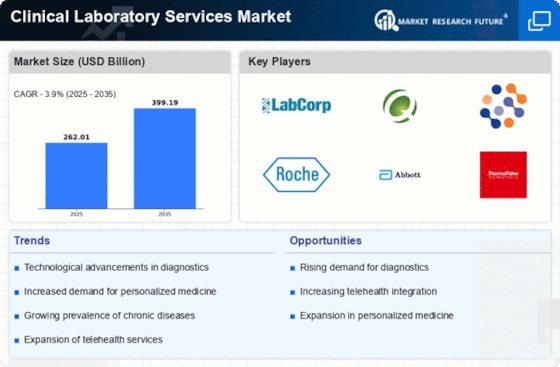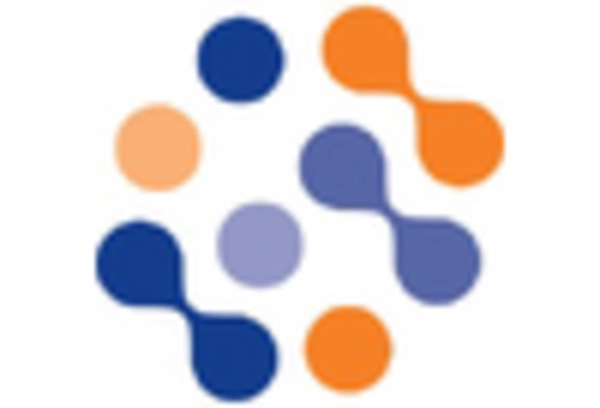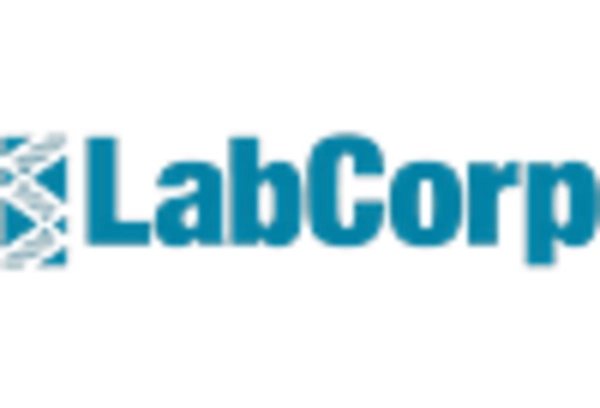Clinical Chemistry
Microbiology
Pathology
Genetic Testing
Immunology
Laboratory Testing Services
Consultation Services
Support Services
Hospitals
Diagnostic Laboratories
Clinics
Research Institutions
Conventional Laboratory Technology
Automated Laboratory Technology
Point-of-Care Testing
North America
Europe
South America
Asia Pacific
Middle East and Africa
North America Outlook (USD Billion, 2019-2035)
North America Clinical Laboratory Services Market by Test Type
Clinical Chemistry
Microbiology
Pathology
Genetic Testing
Immunology
North America Clinical Laboratory Services Market by Service Type
Laboratory Testing Services
Consultation Services
Support Services
North America Clinical Laboratory Services Market by End User Type
Hospitals
Diagnostic Laboratories
Clinics
Research Institutions
North America Clinical Laboratory Services Market by Technology Type
Conventional Laboratory Technology
Automated Laboratory Technology
Point-of-Care Testing
North America Clinical Laboratory Services Market by Regional Type
US
Canada
US Outlook (USD Billion, 2019-2035)
US Clinical Laboratory Services Market by Test Type
Clinical Chemistry
Microbiology
Pathology
Genetic Testing
Immunology
US Clinical Laboratory Services Market by Service Type
Laboratory Testing Services
Consultation Services
Support Services
US Clinical Laboratory Services Market by End User Type
Hospitals
Diagnostic Laboratories
Clinics
Research Institutions
US Clinical Laboratory Services Market by Technology Type
Conventional Laboratory Technology
Automated Laboratory Technology
Point-of-Care Testing
CANADA Outlook (USD Billion, 2019-2035)
CANADA Clinical Laboratory Services Market by Test Type
Clinical Chemistry
Microbiology
Pathology
Genetic Testing
Immunology
CANADA Clinical Laboratory Services Market by Service Type
Laboratory Testing Services
Consultation Services
Support Services
CANADA Clinical Laboratory Services Market by End User Type
Hospitals
Diagnostic Laboratories
Clinics
Research Institutions
CANADA Clinical Laboratory Services Market by Technology Type
Conventional Laboratory Technology
Automated Laboratory Technology
Point-of-Care Testing
Europe Outlook (USD Billion, 2019-2035)
Europe Clinical Laboratory Services Market by Test Type
Clinical Chemistry
Microbiology
Pathology
Genetic Testing
Immunology
Europe Clinical Laboratory Services Market by Service Type
Laboratory Testing Services
Consultation Services
Support Services
Europe Clinical Laboratory Services Market by End User Type
Hospitals
Diagnostic Laboratories
Clinics
Research Institutions
Europe Clinical Laboratory Services Market by Technology Type
Conventional Laboratory Technology
Automated Laboratory Technology
Point-of-Care Testing
Europe Clinical Laboratory Services Market by Regional Type
Germany
UK
France
Russia
Italy
Spain
Rest of Europe
GERMANY Outlook (USD Billion, 2019-2035)
GERMANY Clinical Laboratory Services Market by Test Type
Clinical Chemistry
Microbiology
Pathology
Genetic Testing
Immunology
GERMANY Clinical Laboratory Services Market by Service Type
Laboratory Testing Services
Consultation Services
Support Services
GERMANY Clinical Laboratory Services Market by End User Type
Hospitals
Diagnostic Laboratories
Clinics
Research Institutions
GERMANY Clinical Laboratory Services Market by Technology Type
Conventional Laboratory Technology
Automated Laboratory Technology
Point-of-Care Testing
UK Outlook (USD Billion, 2019-2035)
UK Clinical Laboratory Services Market by Test Type
Clinical Chemistry
Microbiology
Pathology
Genetic Testing
Immunology
UK Clinical Laboratory Services Market by Service Type
Laboratory Testing Services
Consultation Services
Support Services
UK Clinical Laboratory Services Market by End User Type
Hospitals
Diagnostic Laboratories
Clinics
Research Institutions
UK Clinical Laboratory Services Market by Technology Type
Conventional Laboratory Technology
Automated Laboratory Technology
Point-of-Care Testing
FRANCE Outlook (USD Billion, 2019-2035)
FRANCE Clinical Laboratory Services Market by Test Type
Clinical Chemistry
Microbiology
Pathology
Genetic Testing
Immunology
FRANCE Clinical Laboratory Services Market by Service Type
Laboratory Testing Services
Consultation Services
Support Services
FRANCE Clinical Laboratory Services Market by End User Type
Hospitals
Diagnostic Laboratories
Clinics
Research Institutions
FRANCE Clinical Laboratory Services Market by Technology Type
Conventional Laboratory Technology
Automated Laboratory Technology
Point-of-Care Testing
RUSSIA Outlook (USD Billion, 2019-2035)
RUSSIA Clinical Laboratory Services Market by Test Type
Clinical Chemistry
Microbiology
Pathology
Genetic Testing
Immunology
RUSSIA Clinical Laboratory Services Market by Service Type
Laboratory Testing Services
Consultation Services
Support Services
RUSSIA Clinical Laboratory Services Market by End User Type
Hospitals
Diagnostic Laboratories
Clinics
Research Institutions
RUSSIA Clinical Laboratory Services Market by Technology Type
Conventional Laboratory Technology
Automated Laboratory Technology
Point-of-Care Testing
ITALY Outlook (USD Billion, 2019-2035)
ITALY Clinical Laboratory Services Market by Test Type
Clinical Chemistry
Microbiology
Pathology
Genetic Testing
Immunology
ITALY Clinical Laboratory Services Market by Service Type
Laboratory Testing Services
Consultation Services
Support Services
ITALY Clinical Laboratory Services Market by End User Type
Hospitals
Diagnostic Laboratories
Clinics
Research Institutions
ITALY Clinical Laboratory Services Market by Technology Type
Conventional Laboratory Technology
Automated Laboratory Technology
Point-of-Care Testing
SPAIN Outlook (USD Billion, 2019-2035)
SPAIN Clinical Laboratory Services Market by Test Type
Clinical Chemistry
Microbiology
Pathology
Genetic Testing
Immunology
SPAIN Clinical Laboratory Services Market by Service Type
Laboratory Testing Services
Consultation Services
Support Services
SPAIN Clinical Laboratory Services Market by End User Type
Hospitals
Diagnostic Laboratories
Clinics
Research Institutions
SPAIN Clinical Laboratory Services Market by Technology Type
Conventional Laboratory Technology
Automated Laboratory Technology
Point-of-Care Testing
REST OF EUROPE Outlook (USD Billion, 2019-2035)
REST OF EUROPE Clinical Laboratory Services Market by Test Type
Clinical Chemistry
Microbiology
Pathology
Genetic Testing
Immunology
REST OF EUROPE Clinical Laboratory Services Market by Service Type
Laboratory Testing Services
Consultation Services
Support Services
REST OF EUROPE Clinical Laboratory Services Market by End User Type
Hospitals
Diagnostic Laboratories
Clinics
Research Institutions
REST OF EUROPE Clinical Laboratory Services Market by Technology Type
Conventional Laboratory Technology
Automated Laboratory Technology
Point-of-Care Testing
APAC Outlook (USD Billion, 2019-2035)
APAC Clinical Laboratory Services Market by Test Type
Clinical Chemistry
Microbiology
Pathology
Genetic Testing
Immunology
APAC Clinical Laboratory Services Market by Service Type
Laboratory Testing Services
Consultation Services
Support Services
APAC Clinical Laboratory Services Market by End User Type
Hospitals
Diagnostic Laboratories
Clinics
Research Institutions
APAC Clinical Laboratory Services Market by Technology Type
Conventional Laboratory Technology
Automated Laboratory Technology
Point-of-Care Testing
APAC Clinical Laboratory Services Market by Regional Type
China
India
Japan
South Korea
Malaysia
Thailand
Indonesia
Rest of APAC
CHINA Outlook (USD Billion, 2019-2035)
CHINA Clinical Laboratory Services Market by Test Type
Clinical Chemistry
Microbiology
Pathology
Genetic Testing
Immunology
CHINA Clinical Laboratory Services Market by Service Type
Laboratory Testing Services
Consultation Services
Support Services
CHINA Clinical Laboratory Services Market by End User Type
Hospitals
Diagnostic Laboratories
Clinics
Research Institutions
CHINA Clinical Laboratory Services Market by Technology Type
Conventional Laboratory Technology
Automated Laboratory Technology
Point-of-Care Testing
INDIA Outlook (USD Billion, 2019-2035)
INDIA Clinical Laboratory Services Market by Test Type
Clinical Chemistry
Microbiology
Pathology
Genetic Testing
Immunology
INDIA Clinical Laboratory Services Market by Service Type
Laboratory Testing Services
Consultation Services
Support Services
INDIA Clinical Laboratory Services Market by End User Type
Hospitals
Diagnostic Laboratories
Clinics
Research Institutions
INDIA Clinical Laboratory Services Market by Technology Type
Conventional Laboratory Technology
Automated Laboratory Technology
Point-of-Care Testing
JAPAN Outlook (USD Billion, 2019-2035)
JAPAN Clinical Laboratory Services Market by Test Type
Clinical Chemistry
Microbiology
Pathology
Genetic Testing
Immunology
JAPAN Clinical Laboratory Services Market by Service Type
Laboratory Testing Services
Consultation Services
Support Services
JAPAN Clinical Laboratory Services Market by End User Type
Hospitals
Diagnostic Laboratories
Clinics
Research Institutions
JAPAN Clinical Laboratory Services Market by Technology Type
Conventional Laboratory Technology
Automated Laboratory Technology
Point-of-Care Testing
SOUTH KOREA Outlook (USD Billion, 2019-2035)
SOUTH KOREA Clinical Laboratory Services Market by Test Type
Clinical Chemistry
Microbiology
Pathology
Genetic Testing
Immunology
SOUTH KOREA Clinical Laboratory Services Market by Service Type
Laboratory Testing Services
Consultation Services
Support Services
SOUTH KOREA Clinical Laboratory Services Market by End User Type
Hospitals
Diagnostic Laboratories
Clinics
Research Institutions
SOUTH KOREA Clinical Laboratory Services Market by Technology Type
Conventional Laboratory Technology
Automated Laboratory Technology
Point-of-Care Testing
MALAYSIA Outlook (USD Billion, 2019-2035)
MALAYSIA Clinical Laboratory Services Market by Test Type
Clinical Chemistry
Microbiology
Pathology
Genetic Testing
Immunology
MALAYSIA Clinical Laboratory Services Market by Service Type
Laboratory Testing Services
Consultation Services
Support Services
MALAYSIA Clinical Laboratory Services Market by End User Type
Hospitals
Diagnostic Laboratories
Clinics
Research Institutions
MALAYSIA Clinical Laboratory Services Market by Technology Type
Conventional Laboratory Technology
Automated Laboratory Technology
Point-of-Care Testing
THAILAND Outlook (USD Billion, 2019-2035)
THAILAND Clinical Laboratory Services Market by Test Type
Clinical Chemistry
Microbiology
Pathology
Genetic Testing
Immunology
THAILAND Clinical Laboratory Services Market by Service Type
Laboratory Testing Services
Consultation Services
Support Services
THAILAND Clinical Laboratory Services Market by End User Type
Hospitals
Diagnostic Laboratories
Clinics
Research Institutions
THAILAND Clinical Laboratory Services Market by Technology Type
Conventional Laboratory Technology
Automated Laboratory Technology
Point-of-Care Testing
INDONESIA Outlook (USD Billion, 2019-2035)
INDONESIA Clinical Laboratory Services Market by Test Type
Clinical Chemistry
Microbiology
Pathology
Genetic Testing
Immunology
INDONESIA Clinical Laboratory Services Market by Service Type
Laboratory Testing Services
Consultation Services
Support Services
INDONESIA Clinical Laboratory Services Market by End User Type
Hospitals
Diagnostic Laboratories
Clinics
Research Institutions
INDONESIA Clinical Laboratory Services Market by Technology Type
Conventional Laboratory Technology
Automated Laboratory Technology
Point-of-Care Testing
REST OF APAC Outlook (USD Billion, 2019-2035)
REST OF APAC Clinical Laboratory Services Market by Test Type
Clinical Chemistry
Microbiology
Pathology
Genetic Testing
Immunology
REST OF APAC Clinical Laboratory Services Market by Service Type
Laboratory Testing Services
Consultation Services
Support Services
REST OF APAC Clinical Laboratory Services Market by End User Type
Hospitals
Diagnostic Laboratories
Clinics
Research Institutions
REST OF APAC Clinical Laboratory Services Market by Technology Type
Conventional Laboratory Technology
Automated Laboratory Technology
Point-of-Care Testing
South America Outlook (USD Billion, 2019-2035)
South America Clinical Laboratory Services Market by Test Type
Clinical Chemistry
Microbiology
Pathology
Genetic Testing
Immunology
South America Clinical Laboratory Services Market by Service Type
Laboratory Testing Services
Consultation Services
Support Services
South America Clinical Laboratory Services Market by End User Type
Hospitals
Diagnostic Laboratories
Clinics
Research Institutions
South America Clinical Laboratory Services Market by Technology Type
Conventional Laboratory Technology
Automated Laboratory Technology
Point-of-Care Testing
South America Clinical Laboratory Services Market by Regional Type
Brazil
Mexico
Argentina
Rest of South America
BRAZIL Outlook (USD Billion, 2019-2035)
BRAZIL Clinical Laboratory Services Market by Test Type
Clinical Chemistry
Microbiology
Pathology
Genetic Testing
Immunology
BRAZIL Clinical Laboratory Services Market by Service Type
Laboratory Testing Services
Consultation Services
Support Services
BRAZIL Clinical Laboratory Services Market by End User Type
Hospitals
Diagnostic Laboratories
Clinics
Research Institutions
BRAZIL Clinical Laboratory Services Market by Technology Type
Conventional Laboratory Technology
Automated Laboratory Technology
Point-of-Care Testing
MEXICO Outlook (USD Billion, 2019-2035)
MEXICO Clinical Laboratory Services Market by Test Type
Clinical Chemistry
Microbiology
Pathology
Genetic Testing
Immunology
MEXICO Clinical Laboratory Services Market by Service Type
Laboratory Testing Services
Consultation Services
Support Services
MEXICO Clinical Laboratory Services Market by End User Type
Hospitals
Diagnostic Laboratories
Clinics
Research Institutions
MEXICO Clinical Laboratory Services Market by Technology Type
Conventional Laboratory Technology
Automated Laboratory Technology
Point-of-Care Testing
ARGENTINA Outlook (USD Billion, 2019-2035)
ARGENTINA Clinical Laboratory Services Market by Test Type
Clinical Chemistry
Microbiology
Pathology
Genetic Testing
Immunology
ARGENTINA Clinical Laboratory Services Market by Service Type
Laboratory Testing Services
Consultation Services
Support Services
ARGENTINA Clinical Laboratory Services Market by End User Type
Hospitals
Diagnostic Laboratories
Clinics
Research Institutions
ARGENTINA Clinical Laboratory Services Market by Technology Type
Conventional Laboratory Technology
Automated Laboratory Technology
Point-of-Care Testing
REST OF SOUTH AMERICA Outlook (USD Billion, 2019-2035)
REST OF SOUTH AMERICA Clinical Laboratory Services Market by Test Type
Clinical Chemistry
Microbiology
Pathology
Genetic Testing
Immunology
REST OF SOUTH AMERICA Clinical Laboratory Services Market by Service Type
Laboratory Testing Services
Consultation Services
Support Services
REST OF SOUTH AMERICA Clinical Laboratory Services Market by End User Type
Hospitals
Diagnostic Laboratories
Clinics
Research Institutions
REST OF SOUTH AMERICA Clinical Laboratory Services Market by Technology Type
Conventional Laboratory Technology
Automated Laboratory Technology
Point-of-Care Testing
MEA Outlook (USD Billion, 2019-2035)
MEA Clinical Laboratory Services Market by Test Type
Clinical Chemistry
Microbiology
Pathology
Genetic Testing
Immunology
MEA Clinical Laboratory Services Market by Service Type
Laboratory Testing Services
Consultation Services
Support Services
MEA Clinical Laboratory Services Market by End User Type
Hospitals
Diagnostic Laboratories
Clinics
Research Institutions
MEA Clinical Laboratory Services Market by Technology Type
Conventional Laboratory Technology
Automated Laboratory Technology
Point-of-Care Testing
MEA Clinical Laboratory Services Market by Regional Type
GCC Countries
South Africa
Rest of MEA
GCC COUNTRIES Outlook (USD Billion, 2019-2035)
GCC COUNTRIES Clinical Laboratory Services Market by Test Type
Clinical Chemistry
Microbiology
Pathology
Genetic Testing
Immunology
GCC COUNTRIES Clinical Laboratory Services Market by Service Type
Laboratory Testing Services
Consultation Services
Support Services
GCC COUNTRIES Clinical Laboratory Services Market by End User Type
Hospitals
Diagnostic Laboratories
Clinics
Research Institutions
GCC COUNTRIES Clinical Laboratory Services Market by Technology Type
Conventional Laboratory Technology
Automated Laboratory Technology
Point-of-Care Testing
SOUTH AFRICA Outlook (USD Billion, 2019-2035)
SOUTH AFRICA Clinical Laboratory Services Market by Test Type
Clinical Chemistry
Microbiology
Pathology
Genetic Testing
Immunology
SOUTH AFRICA Clinical Laboratory Services Market by Service Type
Laboratory Testing Services
Consultation Services
Support Services
SOUTH AFRICA Clinical Laboratory Services Market by End User Type
Hospitals
Diagnostic Laboratories
Clinics
Research Institutions
SOUTH AFRICA Clinical Laboratory Services Market by Technology Type
Conventional Laboratory Technology
Automated Laboratory Technology
Point-of-Care Testing
REST OF MEA Outlook (USD Billion, 2019-2035)
REST OF MEA Clinical Laboratory Services Market by Test Type
Clinical Chemistry
Microbiology
Pathology
Genetic Testing
Immunology
REST OF MEA Clinical Laboratory Services Market by Service Type
Laboratory Testing Services
Consultation Services
Support Services
REST OF MEA Clinical Laboratory Services Market by End User Type
Hospitals
Diagnostic Laboratories
Clinics
Research Institutions
REST OF MEA Clinical Laboratory Services Market by Technology Type
Conventional Laboratory Technology
Automated Laboratory Technology
Point-of-Care Testing


















Leave a Comment